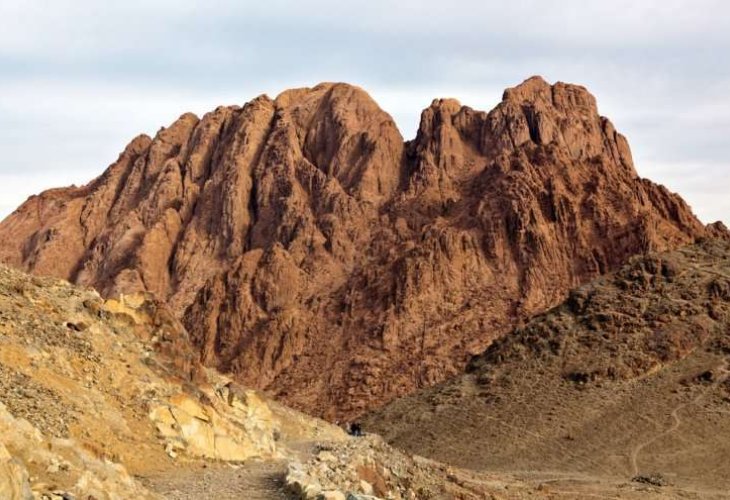In Search of God
The Revelation at Mount Sinai: Why No Other Nation Ever Claimed to Hear God’s Voice
Millions witnessed the giving of the Torah at Sinai — a public revelation so powerful it could never be invented, forgotten, or repeated
 (Photo: shutterstock)
(Photo: shutterstock)When Moshe spoke to the people about the giving of the Torah at Mount Sinai, he explained that the revelation at Sinai would be utterly unique, never to be repeated in the history of the world.
He challenged his listeners — and, by extension, every future generation, to reflect on this fact: “Ask now about the former days that were before you, from the day that God created man on the earth, and from one end of the heavens to the other — has anything so great as this ever happened, or has anything like it ever been heard of? Has any people ever heard the voice of God speaking out of the fire, as you have heard, and lived?” (Devarim 4:32–33)
Across all of human history — from creation itself and from one end of the heavens to the other, there has never been, nor will there ever be, another event in which the Creator of the universe reveals Himself publicly to an entire nation.
A Public Experience No One Could Deny
Moshe reminded the people that they themselves had heard the voice of God. Every individual among them had personally experienced that moment at Sinai. Had the event not actually occurred publicly before their eyes, these very words would have instantly exposed Moshe as a deceiver. How could one tell an entire nation, “You yourselves heard God’s voice,” if they hadn’t? How could anyone deny the direct experience of millions?
And yet — no one objected. The people remained silent. Not one person stood up to say, “We didn’t see that,” or “We didn’t hear anything.”
This silence is extraordinary when we recall that the Israelites were far from timid. Throughout their forty years in the wilderness, they complained repeatedly about food, water, leadership, and fear of enemies. They quarreled, rebelled, and even accused Moshe of deceiving them. Yet when Moshe made the boldest claim possible — that they had personally heard the voice of God, there was no protest or denial. Their silence was agreement. Their memory confirmed it.
A Story That Could Never Be Invented
It is impossible to suggest that such a story slowly evolved over generations. How could anyone “insert” into a nation’s collective memory a claim that they themselves once stood together and heard God’s voice — if such an event had never occurred?
Imagine someone today telling us that, five hundred years ago, the entire Jewish people lived together in France. We would immediately ask, “If that really happened, why have I never heard it from my parents, my teachers, or any history book?” All existing records from every corner of the world would contradict the claim.
Likewise, if the Sinai revelation had not been real, countless testimonies across the generations would have contradicted it.
It's impossible to fabricate a collective national memory involving millions of eyewitnesses.
A Prophecy That Time Itself Has Proven
Moshe didn't only describe the uniqueness of Sinai, but he made a prophetic declaration: “Has anything so great ever happened, or has anything like it ever been heard of? Has any people heard the voice of God speaking out of the fire, as you have heard, and lived?”
He was telling them: No other nation will ever claim such an event.
Not only will it never actually happen again, but no other religion or culture will even pretend it happened.
How could Moshe know this? What if, someday in the distant future, another nation claimed that God had appeared to all of them?
Moshe staked his credibility — and that of the entire Torah, on this bold prediction.
Yet here we are, over 3,000 years later, with the full record of human civilization before us. We know the origins of all major religions, and indeed, none have ever claimed a public, mass revelation. Every prophet, guru, or religious founder has spoken of private inspiration or personal visions: a single individual who “saw” or “heard” and then told others.
By contrast, the Torah describes a revelation witnessed by an entire nation. This distinction remains unmatched. History has fulfilled Moshe's words precisely as he predicted.
Why No Other Nation Could Claim It
A public revelation involving millions cannot be invented after the fact. If someone were to claim it, the people would immediately respond: “We never heard that! Our ancestors never told us such a thing!”
For this reason, no other faith — despite their desire to strengthen belief, has ever dared to claim a mass revelation. Such an event can neither be fabricated nor forgotten. It either happened, or it did not.
The world’s memory stands as witness: Only one nation, the people of Israel, has ever claimed that the Creator of the universe revealed Himself before an entire nation, giving them His law.
That is the event of Mount Sinai — singular, unforgettable, and forever woven into the collective consciousness of a people and of humanity itself.

